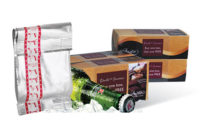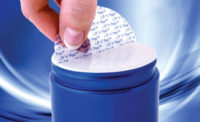Materials Technology: Adhesives & Tapes
Adhesives and tapes are functional, safe and easy to use
A look at the material advancements born from today’s changing trends.

RP62 EU adhesive produces cardboard tear on tampered pharmaceutical product packs for a visible indication of tampering

Compared with paperboard, shrink film and plastic ring-based multipacks, Nature MultiPack uses less packaging material and delivers a premium look and feel.

John Bennett, vice president, Product Identification Business Team, FLEXcon



Adhesives and tapes are used in nearly everything that is packaged, from snack bars to baby wipes, and are used in labeling, reseal tabs and multipacking. With the rise in consumer demand for reseal properties in a lot of today’s foods, particularly snacks, as well as the growing popularity of multipacks, it makes sense that demand is rising. Global demand for adhesives and sealants is forecast to rise 4.5% per year through 2019 to 20.2 million metric tons, valued at $64 billion, according to The Freedonia Group (freedoniagroup.com).
Over the last few years, the snack aisle has seen more crackers, chips and cookie packaging launched with reseal tabs and stickers to allow consumers to eat a handful and then tape up the package for later. This innovation keeps the product from going stale and reduces the need for other tools, like a chip clip. Breakthroughs in the segment ensure multiple seals with the same integrity as the first, meaning that package of Oreos is just as fresh today as it was a week ago when it was opened.
Multipacks deliver safe handling and ease of use
Multipacks are always a popular choice for beverages, from soda to sports drinks and juice boxes to water, most consumers agree that buying in multiples is the way to go. A new multipack option allows for the packing of multiple PET bottles with specially developed adhesives. Nature MultiPack™ from KHS (khs.com) delivers convenient handles and individual bottle orientation for easy consumer use, as well as to effectively convey marketing messages. The pack is designed to be strong enough to endure transportation and merchandising, but also easy enough for consumers to separate the bottles from the pack.
Compared with other popular multipack materials like paperboard, shrink film and plastic ring-based multipacks, Nature MultiPack uses far less packaging material and delivers a premium look and feel. The KHS-developed pack won a 2016 German Design Award for outstanding communication design and sustainable packaging.
“Disruptive innovation is an important part of our strategy at KHS, as well as within the Salzgitter group of companies. Nature MultiPack™ will change the future of packaging… After introducing the world to shrink packs over 50 years ago, with this packaging we are again proving to be successful with a market-defining hit,” says Professor Niemeyer, chairman of the Executive Management Board at KHS.
It isn’t just the snacks or beverage segments experiencing growth. The healthcare industry is propelling the demand for adhesive tapes, according to research firm Technavio (technavio.com).
New labeling and adhesive products launch for the pharmaceutical and healthcare industries
UPM Raflatac (upmraflatac.com) announces the launch of a renewed product portfolio for pharmaceutical, healthcare and laboratory applications in the Americas. These materials are designed to excel in even the most demanding environments, including pharmaceutical packaging, vials and test tubes, blood bags, and cold and cryogenic storage.
New products in the portfolio include the latest high-performance solutions for primary blood bag labeling and a unique material for labeling sterilization wraps for surgical instruments in hospitals. Following an extensive, standards-compliant product development process, UPM Raflatac has produced a primary blood bag label stock range based on a unique adhesive – RP32 PB. The adhesive is designed to endure high temperatures, as well as long-term storage in low-temperature environments.
The company has also launched a range of pharmaceutical labeling materials that support compliance with the Falsified Medicines Directive (2011/62/EU) regarding packaging for prescription drugs and high-risk, over-the-counter medicines. By incorporating tamper-evident features as described in the new EN 16679, these products help protect the supply chain from counterfeit materials. RP62 EU adhesive produces a visible cardboard tear on tampered pharmaceutical product packs for easy recognition. An added perk is that the clear film labels are still compatible with existing package designs.
New adhesives and tapes deliver on consumer and packager concerns for safety and ease of use, not to mention the strength and integrity that we all rely on the materials to deliver.
Resealable packaging
John Bennett, vice president, Product Identification Business Team, FLEXcon shares his insight.
Consumers today lead fast-paced lives, are increasingly health-conscious and are seeking convenient products designed for their busy lifestyles. Many companies now use resealable packaging to offer increased convenience to these on-the-go consumers.
On your last trip to the grocery store, you may have noticed a new trend – packages of pre-cut, peeled fruits. This is a perfect example of the benefits of resealable packaging technology. It provides a convenient, portable, pre-measured snack portion to promote healthy eating, while maintaining the freshness of the food. Resealable packaging is now used for everything from food to cleaning wipes. It provides convenience and cost savings, allowing consumers to save money by just buying what they need.
In addition to providing benefits to consumers, resealable packaging also provides cost savings to the business by reducing packaging costs, as large bottles of products often include more expensive materials than are used in flexible packaging. And by extending the life of a perishable product (pre-packaged meat at a deli counter, for example), food companies can save huge amounts of money.
How can consumer goods companies select the right resealable packaging technology? Resealable packaging can be customized to meet specific product needs. For example, for meats and cheeses, a moisture vapor film barrier can seal away oxygen to preserve freshness. Alternatively, for products like vegetables that need oxygen to stay fresh, manufacturers are able to modify the film for better permeation of oxygen through the package. This is also important for products such as baby wipes that must maintain their moisture in order to work effectively. Companies should also be mindful of choosing the right adhesive to match the particular flow wrap surface they are working with.
Companies looking to implement resealable packaging for food products must also take into consideration FDA requirements for indirect and direct food contact. It’s important to ensure that any material that comes into contact with food – including adhesives, films, surface coatings and inks – meets these regulations. By staying up to date on industry standards, companies can ensure the safety of consumers and guarantee their products are compliant.
With many consumer goods businesses moving toward becoming ‘lifestyle brands,’ resealable packaging allows them to respond to market demands and deliver innovative products that integrate easily into customers’ lives. This allows them to eliminate the stress of taking products on the go, enabling consumers to lead a more healthy, active lifestyle, while achieving cost savings.
FLEXcon (FLEXcon.com) is a global leader in coated and laminated films and adhesives used in graphics applications, manufactured goods and new products. For 60 years, FLEXcon has provided a collaborative, consultative approach to deliver unique solutions that help customers achieve better business results. FLEXcon is a trusted partner to a wide range of companies from printers and fabricators to engineers and designers, developing products for existing and emerging markets.
Looking for a reprint of this article?
From high-res PDFs to custom plaques, order your copy today!









